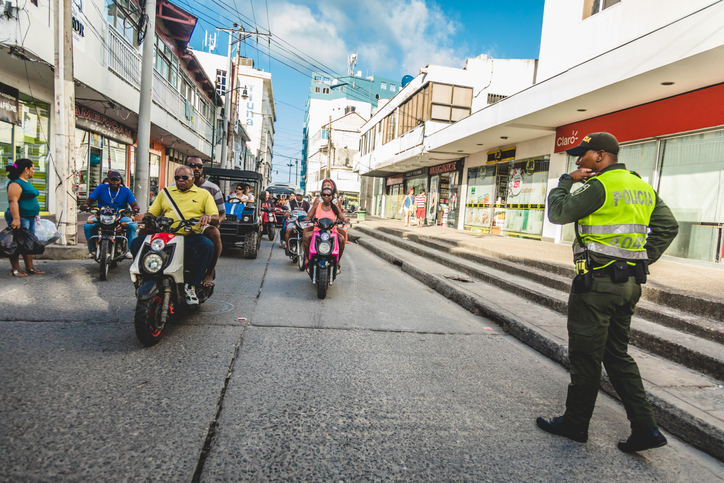One day Ignacio was on his way to work in Bogotá, Colombia, when a police officer stopped and searched him. This did not seem like an unusual search—it was just like the many others he had been subjected to. However, upon checking his citizenship card, the officer told him that he was being arrested for the crime of identity fraud. Ignacio ended up in a detention center for the next 36 hours, with little understanding of what he was accused of. As a result of his incarceration, he lost his job and employment benefits, including health insurance for himself and his family. Because of this experience, he developed a fear of the police and was thrown into the informal labor market, which wiped out his savings and left him with no access to the healthcare system. His family, including his minor daughters, also began to live with food insecurity and without access to health insurance.
Ignacio is one of the 40,000 people, the vast majority of whom are Colombian Venezuelans, who have been arbitrarily deprived of their Colombian nationality since late 2021. At that time, Colombia's National Civil Registry Office—the agency in charge of registering births and naturalizations—in addition to issuing and validating these cédulas (national ID cards), began to annul the civil registrations and consequently cancel the cédulas of these people.
Ignacio's story, like that of many others affected, involves his triple victimization: he is the son of a person who was displaced by the Colombian conflict who had previously settled in Venezuela, he then had to migrate forcibly as a returnee to Colombia, only for his rights to be violated there through the arbitrary deprivation of the nationality to which he was entitled.
The registry office violated procedural guarantees and did not secure the rights of the affected people—it had arbitrarily deprived them of their nationality. In most of the cases, the registry office did not notify the individuals that a procedure would be initiated, nor did it give the individuals the opportunity to defend themselves or provide evidence that would clarify their situation. Moreover, the registry office canceled numerous registrations without detailing the factual causes of the cancellation and annulment of their identification documents. And, in many cases, as has been pointed out by solid investigations by Colombian civil society, the registry office annulled these registrations on grounds that were neither factually true nor based on Colombian law.
The co-authors of this post are part of a group of human rights defenders who, together with organizations that defend the rights associated with human mobility, collected Ignacio's testimony, as well as that of nine other people, to produce the first study on the social effects of the arbitrary deprivation of nationality in Colombia.
This report shows how the deprivation of nationality generated multidimensional and preventable harm. The lives of those affected are disrupted in different spheres and, had domestic and international procedural guarantees been respected, what we document would have been avoided. Some of the levels of harm identified were economic (loss of employment), psychological (anxiety and depression), and to the exercise of rights based on the proof of the identity of the person (voting, opening and managing a bank account, signing a contract, finding housing, etc).
Moreover, in our research we identified a “spillover effect,” whereby the registry office’s actions not only affected individuals who were deprived of their nationality but also their family members, in particular their children, enacting what sociologists have termed “multigenerational punishment.”
Colombian civil society, from universities and legal clinics specializing in human mobility to international cooperation organizations and community-based organizations, among others, has promoted initiatives to confront this problem.
There are strategies to mitigate and combat this human rights violation through actions directly related to the people affected. For example, joint brigades have been carried out to alert the returnee population that they might encounter this problem. Free legal advice has been provided to these individuals and their family members. Another initiative in the same vein, the initiative of JRS-Colombia and the Pontifical Javeriana University, seeks to empower people who have experienced the annulment and promote a space for dialogue with political institutions in this regard.
Other strategies, including advocacy and visibility, seek a greater impact. Several cases have reached the Constitutional Court of Colombia, which is still in the process of issuing a ruling. These cases reached the court because of the advocacy of civil society actors who intervened and requested the protection not only of the rights of the plaintiffs in the selected cases but also of thousands of people who have not recovered the validity of their documents. We also sought to raise the visibility of the case through high-impact litigation that has allowed civil society organizations to expose this situation before the Inter-American Commission on Human Rights, thanks to the efforts of the Strategic Litigation Network on Migration at the end of 2022.
The report we coauthored is part of the visibility and advocacy strategy. This study was born from the collaboration between the social sciences and the defense of human rights from the legal field. Social-scientific tools made it possible to collect testimonies that identify the types of damage caused by arbitrary deprivation, while simultaneously serving as a document-witness of the experiences of the people affected.
While the analytical approach of the report establishes the need for an appropriate level of authority in the face of the cancellation of citizenship documents, the experience of these people should humanize reflections on denationalization: they are not cases or numbers, but, as shown in Ignacio's story, the real lives of individuals and families.

